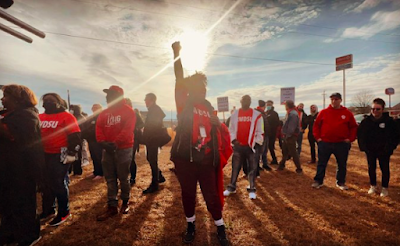"It was a portal through which we collectively, many of us, were momentarily allowed to dream of what the future could look like if this emerging or emergent behemoth of Amazon had more democratic control, if workers had more collective power and more say over their workplaces, over how the economy is run so on and so forth...", Robin D.G. Kelley, October 2021
words by Charles Brooks
April 2, 2022 UPDATE: According to the NLRB, the recent election results show 993 versus 875 who want to join the RWDSU but due to 416 “challenged” votes – the results cannot be certified. The results are on hold until the NLRB holds a hearing that, “processes the challenges and any objections the parties may file.
 |
| Photo credit: BAmazon photo gallery |
Workers at the Amazon fulfillment center in Bessemer, Alabama, are once again engaged in a pitched battle to unionize there. Although, workers voted last year not to join the Retail, Wholesale and Department Store Union (RWDSU), the National Labor Relations Board (NLRB) “set aside” the election results due to Amazon’s anti-union activities and ordered new elections.
The workers there now not only have a second chance to make history but to continue the momentum that has already ignited similar organizing activities across the country. The political and economic implications of a win is so enormous that it is no understatement to say the stakes here are high.
 |
| Photo credit: Joe Piette |
Robin D.G. Kelley, author of Hammer & Hoe spoke extensively last year about Bessemer, providing the much-needed clarity and historical context to the union organizing drive there. During an interview with Democracy Now, Kelley said, “This is definitely the most significant labor struggle of the 21st century, no doubt. The South has been the epicenter of the country’s most radical democratic movements, which is why it’s completely unsurprising that Bessemer, Alabama, would be the place where you’d have a renewed labor movement.”
The organizing drive at Amazon Bessemer showcased Amazon’s aggressive and relentless anti-union campaign as well as the working conditions workers are compelled to persevere through to earn a living. This year’s union drive has thus far proven to be no different than last year, considering Amazon’s tactics.
With ballots scheduled to be counted on March 28th, RWDSU has already filed charges with the NLRB – twice – citing again, Amazon’s misconduct and heavy-handed anti-union tactics. The first complaint was filed in January when a RWDSU organizer working at Amazon’s Bessemer fulfillment center says he received a letter citing “Amazon’s lawful solicitation policy” as a way to restrict his contact with other Amazon workers. A month later, RWDSU filed three charges of Unfair Labor Practices (ULP). The first charge claims that Amazon removed pro-RWDSU union literature and flyers from employee break rooms. The second charge claims Amazon limited workers' access inside the warehouse before and after shifts with an apparent new rule not to be found in the employee policy handbook.
The third charge challenges Amazon’s use of “captive audience” meetings – meetings held by the employer to influence employees against joining the union. Although, these meetings are legal, RWDSU says these captive audience meetings are “coercive” and “workers should have the right, as is already protected under current law”. They point to Section 8(a)(1) of the National Labor Relations Act (NLRA), entitled "Interference with Section 7 Rights" that forbids an employer “to interfere with, restrain, or coerce employees in the exercise of the rights guaranteed in section 7.” In section 7, employees are guaranteed the right to form a union “to bargain collectively through representatives of their own choosing…” as well as the right to "refrain from any or all such activities."
 |
| Photo credit:BAmazon photo gallery |
While Amazon’s heavy-handed tactics and anti-union messaging played a significant role in last year’s election results – this year, workers and supporters are publicly resisting Amazon’s tactics of intimidation. Workers are pushing back against anti-union messaging during captive audience meetings, while engaging in a solid social media campaign with posts and videos of public support. On the ground, there’s a greater opportunity to organize without the weight of COVID restrictions, to engage in more public spaces, more home visits and labor rallies. Equally important is the public support that remains high for the Amazon Bessemer workers. Last year, an AFL-CIO/GBAO poll showed 77 percent supported the union drive, and this year, an Institute for Policy Studies (IPS) poll shows nearly two-thirds of Jefferson County residents support Amazon workers forming a union.
The growing public support reflects the message sent by the workers there at Amazon Bessemer that continues to be heard around the world. A message that has and continues to resonate among workers and inspire union drives. A message that places in full public display the fight ahead while visualizing for us - what is needed and what is possible for union rights, living wages, better working conditions, and their human rights.
Further Reading:
No comments:
Post a Comment